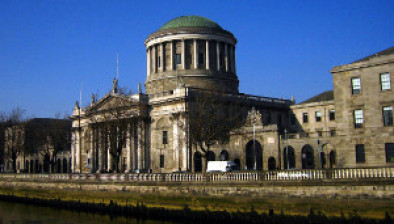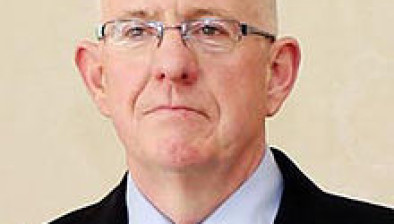High Court: Judge orders Enoch Burke to be released from prison as he was ‘exploiting his imprisonment for his own ends’

The High Court has released Enoch Burke from prison, stating that this was “one of the very rare cases where the coercive imprisonment should stop”. It was held that Mr Burke was motivated to remain in prison, having made a number of illogical decisions during the course of the litigation. The court would not allow Mr Burke to obtain an advantage from his defiance of a court order and his actions, it was said.

About this case:
- Citation:[2022] IEHC 719
- Judgment:
- Court:High Court
- Judge:Mr Justice Brian O'Moore
Delivering judgment in the case, Mr Justice Brian O’Moore noted that Mr Burke had previously been an ordinary teacher in Westmeath and now he was a household name. This was largely due to his imprisonment and the court held that Mr Burke was “exploiting his imprisonment for his own ends”.
The court also considered issues such as the ongoing cost to the taxpayer to keep Mr Burke in prison, the fact that the school was closed during the Christmas period and the non-opposition of the school to his release.
Background
The background to the proceedings are well-known. Mr Burke is a History and German teacher in a school in Westmeath. He was the subject of disciplinary proceedings after altercations involving school staff. The relevant incidents related to Mr Burke’s objection to referring to a student as “they” rather than “he”. Mr Burke was suspended on full pay pending the outcome of the disciplinary process.
However, Mr Burke continued to attend the school, notably by sitting in an empty classroom. He claimed that his religious beliefs did not allow him to refer to the preferred pronoun of the student and that it was manifestly wrong for him to have been suspended. Despite attempts to keep him off the school campus, Mr Burke persisted in attending.
As such, the school brought proceedings against Mr Burke. As part of the proceedings, the school obtained an interim injunction and, later, an interlocutory injunction requiring Mr Burke to stay away from the campus. Unfortunately, Mr Burke continued to attend the campus in defiance of the court order. Accordingly, the school brought an application to commit Mr Burke to prison for civil contempt of court, which was granted.
Mr Burke remained in prison since 5 September 2022 and at all times refused to purge his contempt. Mr Burke strongly opposed case management and an expedited hearing of the High Court proceedings.
He brought an application for a stay on the progression of the High Court proceedings until his appeals against the injunctions had been heard and determined by the Court of Appeal.
On 13 December 2022, Mr Burke’s imprisonment was reviewed by the court. He expressed no desire to leave prison on any terms other than total vindication by victory in the Court of Appeal. Mr Burke also rejected the later suggestion by the court to consider releasing him over the Christmas holidays because the school was closed.
On 19 December 2022, the High Court (O’Moore J.) rejected the stay application, stating that there was no injustice in having the trial run before the appeal hearing, which was set for February 2023.
On 21 December 2022, Mr Justice Brian O’Moore delivered a further decision on whether to release Mr Burke from prison.
High Court
Mr Justice O’Moore outlined the six factors which had to be considered in deciding whether to release Mr Burke. These were 1) the failure to obey a court order; 2) the school’s attitude to his release; 3) the Christmas holidays; 4) the use of public funds; 5) alternative measures; and 6) Mr Burke’s motivation for remaining in prison.
The court held that Mr Burke was in continued breach of a court order and had not advanced any coherent reasons for his disobedience. Keeping him in jail was a logical response to his behaviour, but this did not mean that Mr Burke should be kept in prison indefinitely, the court said. There was “powerful reason” to continue the incarceration due to Mr Burke’s threat to flaunt the relevant order, but this was not definitive.
It was noted that the school had no objection to Mr Burke’s release. Additionally, Mr Burke’s imprisonment was not necessary over the Christmas period since the school would be closed for an extended period. However, the court noted that Mr Burke “actively disparaged” the proposal to let him out over Christmas and would only leave prison if he was vindicated by the Court of Appeal.
The court also considered the use of public funds in the case. Due to the stand-off between the parties, the taxpayers continued to pay Mr Burke’s wages while also paying for the cost of his incarceration. The court said it was “intolerable” for society to indefinitely pay these monies, particularly where Mr Burke was “refusing to countenance his immediate release for reasons which simply make no sense”, the court said.
Mr Justice O’Moore stated that the imprisonment was not the only way to ensure compliance with a court order. For example, the court could impose financial sanctions as a coercive measure. Essentially, the court stated that it could deal with any future breach of court orders by Mr Burke in a different way to incarceration.
Finally, the court considered Mr Burke’s motivation for his imprisonment. The court outlined that Mr Burke was incorrect in his assertion that he was imprisoned for standing up for his religious beliefs. Instead, he brought about his jailing by continuing to attend the school when ordered not to do so.
However, the court noted that Mr Burke had become a household name due to his imprisonment. It was also outlined that Mr Burke had taken key decisions in the course of the litigation which were “quite illogical”. First, nothing in the court orders required Mr Burke to compromise his religious beliefs and yet this was consistently the position adopted by him in the proceedings.
Second, Mr Burke had rejected and frustrated the possibility of an early trial. The case may have been decided at this point and he may have been freed, but instead Mr Burke’s position had extended the duration of his imprisonment. He advanced “utterly unconvincing” grounds to stay the High Court proceedings, the court said.
Third, Mr Burke had “acted in a way designed to prevent his release” by refusing to leave jail for the Christmas period. As such, the court concluded that Mr Burke was exploiting his stay in prison, which “would explain why he took such an unreal view of what the Orders of this Court involved”.
The purpose of imprisonment was to coerce a person to complying with a court order. However, this purpose “is turned on its head when the person concerned is prepared to endure the undoubted discomforts of incarceration in order to obtain some greater benefit”. The only plausible interpretation of Mr Burke’s actions was that he saw an advantage in remaining in prison, the court said.
The court was not prepared to facilitate this advantage to Mr Burke.
Conclusion
Having regard to all matters, Mr Justice O’Moore stated that this was “one of the very rare cases where the coercive imprisonment should stop, at least for the moment” (see Shell v McGrath [2006] IEHC 108; Wardglade Limited v Deery [2021] IEHC 255).
Mr Burke’s release from custody was not for any set period. He will remain at liberty unless any further order was made to imprison him. The school was entitled to come back to seek further attachment and committal, the sequestration of assets or any other appropriate measure if he continued to act in defiance of the orders.
The Board of Management of Wilson’s Hospital School v. Enoch Burke [2022] IEHC 719









